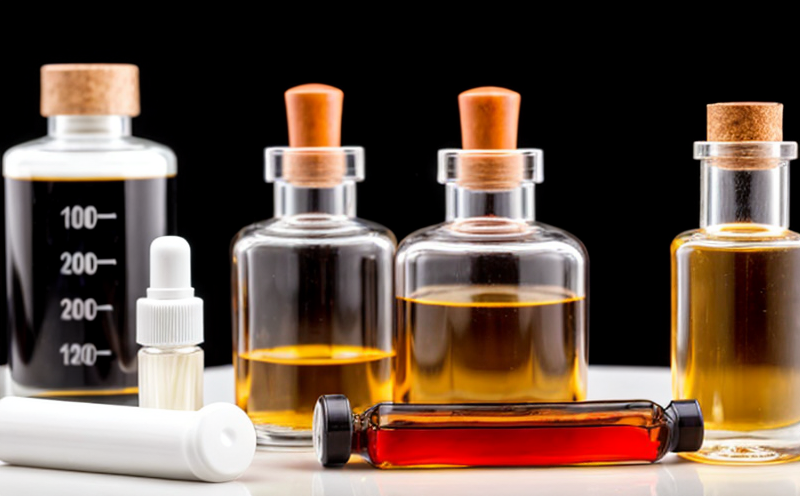ISO 10993 Extractables and Leachables Chemical Testing
The ISO 10993 series of standards provides a framework for ensuring medical devices are safe for use by the general population. One critical aspect within this framework is the evaluation of extractables and leachables. These refer to chemical substances that can be released from a medical device during its intended use or under abuse conditions, potentially posing risks to patients.
The process of extractables and leachables analysis involves identifying all materials used in manufacturing a medical device, including polymers, metals, coatings, adhesives, and lubricants. By simulating real-world scenarios such as storage conditions, autoclaving, or interaction with body fluids like blood or saline solution, we can determine which chemicals could be released into the patient.
The ISO 10993-18 standard specifically addresses extractables and leachables testing. This method aims to predict adverse reactions that might arise due to these released substances. The primary goal is not only to ensure compliance with regulatory requirements but also to protect patient safety.
At Eurolab, our expertise lies in conducting thorough and accurate ISO 10993-18 tests tailored to meet the specific needs of our clients. We employ advanced analytical techniques such as HPLC, GC/MS, and ICP-MS to identify even trace amounts of potentially harmful chemicals.
The testing process begins with careful selection of appropriate solvents that mimic the conditions under which the device will be used. Specimen preparation involves soaking or incubating the device in these solvents for extended periods, followed by filtration and concentration steps to isolate the extractables. Once isolated, the samples undergo detailed analysis using state-of-the-art instrumentation.
Our rigorous quality control measures ensure that every test is conducted according to international standards, providing reliable data that can be trusted by regulatory bodies worldwide. The results of these tests play a crucial role in ensuring the safety and efficacy of medical devices before they reach the market.
In summary, ISO 10993-18 extractables and leachables testing is an essential part of pre-market clinical evaluation for medical device manufacturers. It helps identify potential risks early on, allowing for necessary modifications to design or manufacturing processes. By working closely with our clients throughout this process, Eurolab ensures that all aspects of the test are thoroughly addressed, leading to successful regulatory approval.
Eurolab Advantages
At Eurolab, we pride ourselves on offering unparalleled expertise in ISO 10993-18 extractables and leachables testing. Our team of highly skilled professionals brings together years of experience in pharmaceuticals and medical devices, ensuring that each test is conducted with precision and care.
We offer several key advantages over competitors:
- Comprehensive Testing Capabilities: We provide a full range of analytical services using cutting-edge technology like HPLC, GC/MS, ICP-MS, among others. This allows us to cover all necessary parameters required by ISO standards.
- Experienced Personnel: Our staff includes chemists and engineers specializing in pharmaceuticals and medical devices, ensuring that we understand the nuances of each project.
- State-of-the-Art Facilities: Equipped with top-tier equipment, our laboratories ensure accurate results every time. Regular calibration and maintenance guarantee consistent performance.
- Rigorous Quality Control: Every test undergoes strict quality checks to meet international standards, giving you peace of mind knowing your data is reliable.
- Comprehensive Reporting: Our detailed reports include all relevant information needed for regulatory submissions, streamlining the approval process.
- Client-Centric Approach: We work closely with our clients to ensure their unique needs are met, whether it’s through custom test protocols or expedited turnaround times.
- Global Recognition: Eurolab is accredited by multiple recognized bodies, ensuring that your tests will be accepted worldwide.
Choose Eurolab for all your ISO 10993-18 testing needs. With our expertise and commitment to excellence, you can trust us to deliver accurate results that meet or exceed regulatory requirements.
International Acceptance and Recognition
The ISO 10993 series of standards has gained widespread acceptance among medical device manufacturers globally due to its rigorous approach to ensuring product safety. The ISO 10993-18 specifically focuses on extractables and leachables, which are critical factors in determining whether a medical device poses any risk to patients.
The standard has been endorsed by numerous international regulatory bodies including the FDA (US), MHRA (UK), EMA (EU), and TGA (Australia). This broad acceptance ensures that results from our tests will be widely recognized, reducing the need for additional validations or certifications in different regions.
In addition to its global recognition, ISO 10993-18 is also aligned with other relevant standards such as ASTM E2347, EN ISO 10993-18, and IEC 60601-1. This alignment further enhances the reliability and validity of our test results.
The importance of this standard cannot be overstated, especially given the increasing complexity of modern medical devices. By adhering to these stringent guidelines, manufacturers can demonstrate their commitment to patient safety and regulatory compliance.
At Eurolab, we ensure that all our tests comply with ISO 10993-18 standards. Our accredited laboratories use only the latest equipment and methodologies recommended by leading organizations like ASTM and EN, ensuring accurate and reliable results every time.
Use Cases and Application Examples
| Application Example | Description | Test Parameters |
|---|---|---|
| Biocompatibility Assessment of Medical Devices | Determining the safety profile of medical devices by identifying potential harmful chemicals. | HPLC, GC/MS, ICP-MS; Solvent selection mimicking real-world conditions |
| Development and Optimization of New Materials | Evaluating new materials for use in medical devices to ensure they meet safety standards. | Extractable analysis using diverse solvents |
| Post-Market Surveillance | Monitoring the performance of a device after it has been released onto the market. | Long-term stability testing under various conditions |
| Determination of Residual Solvents | Identifying residual solvents in medical devices to ensure they are safe for patient use. | HPLC; Specific solvent identification and quantification |
| Evaluation of Drug Delivery Systems | Assessing the release of active pharmaceutical ingredients from drug delivery systems. | Leachable analysis using simulated physiological environments |
| Metal-on-Metal Implants | Detecting potential metal ions released into body fluids during use. | ICP-MS; Specific metal ion identification and quantification |





